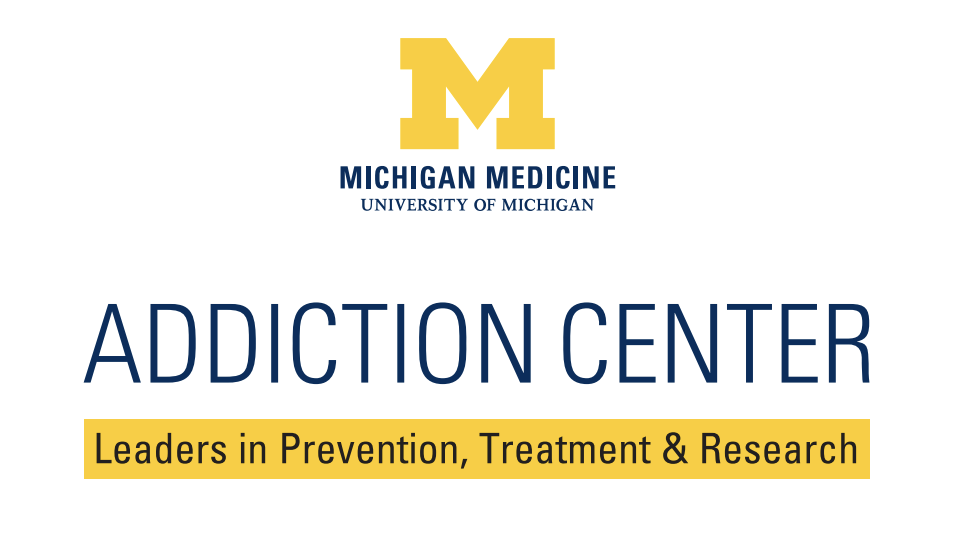With the onset of COVID-19 and people fighting for their lives, a conversation about substance use may seem trivial. Yet, across the United States, and here at Michigan Medicine, the COVID-19 pandemic is causing dramatic increases in substance abuse emergencies, overdoses, and relapses. These are our patients. They’re our loved ones, our friends, our colleagues.
Since 1988, the U-M Addiction Center has done the foundational work and made groundbreaking discoveries and contributions to the field of addiction research. This work continues to uncover the genetic, sociological, neurological, and psychological nature of addiction — and will continue to dispel the assumptions and misinformation that do not align with the science of this preventable and treatable disease. Just imagine that you had heart disease or breast cancer but shame and stigma prevented you from seeking support and treatment. This is the reality for millions of people who suffer from alcohol and other drug addiction. These individuals, their families, and communities have been grappling with the fallout of the addiction crisis.
The Addiction Center’s mission is 3-tiered: Treatment. Education/Training. Research. The center’s team collaborates with colleagues at Michigan Medicine, across the U-M campus, and nationally and internationally, to provide state-of-the-art addiction treatment, to train the next generation of experts in this field, and to conduct innovative addiction research.
TREATMENT
The U-M Addiction Treatment Services (UMATS) is located at Michigan Medicine’s Rachel Upjohn Building. They provide tailored, evidence-based outpatient addiction treatment, specializing in treatment services for adults, young adults, and adolescents, including individuals with both mental health and substance use issues. They also have a specialized treatment program for health professionals with alcohol and drug problems, the Health Professionals Recovery Program. The team of doctors, psychologists, and social workers is dedicated to providing excellent care for individuals and families suffering from addictive disorders. UMATS is currently accepting new patients and offers virtual services. They also provide support services to families affected by a loved one’s addiction.
EDUCATION
The educational training mission provides the next generation of research scientists and addiction treatment providers a solid foundation to carry the field forward. The Addiction Center has three fellowship programs: 1) Addiction Psychiatry Fellowship for post-residency specialization in addiction, 2) the NIAAA T-32 Postdoctoral Research Training Program (now in its 30th year), and 3) the Developmental Neuroimaging Postdoctoral Research Fellowship. In addition, the Addiction Center provides medical student lectures and two undergraduate courses to educate learners on the spectrum of substance abuse.
RESEARCH
The Addiction Center’s highly ranked research program receives extensive funding from the National Institute on Alcohol Abuse and Alcoholism (NIAAA) and the National Institute on Drug Abuse (NIDA). Over the past three decades, the team has made key discoveries, such as:
- how addiction affects the brain
- the factors that make a person susceptible to addiction and ways to prevent it
- tools to accurately diagnose and new methods to treat addiction
The goal of the Addiction Center is to continue to unravel the complexity of addiction in order to change the trajectory of this crisis and save lives.
LATEST RESEARCH FINDINGS
Over the past year, the Addiction Center has made more discoveries. Below are examples of recent findings:

The ImPAT Trial — Improving Pain During Addiction Treatment
Chronic pain is very common among individuals with substance use disorders. Professor Mark Ilgen, Ph.D., and colleagues conducted a randomized clinical trial to determine if non-drug behavioral methods improve pain for those in treatment for substance use disorders. The results showed better pain-related outcomes, including better pain tolerance in men and reductions in pain intensity in women.
Treating Substance Use Disorder in Older Adults
Another milestone in 2020 was the release of the updated Treatment Improvement Protocol (TIP) 26: Treating Substance Use Disorder in Older Adults from the Substance Abuse and Mental Health Services Administration (SAMHSA). U-M Addiction Center Director and Professor, Frederic C. Blow, Ph.D., served as Chair of the National Consensus Panel. This comprehensive treatment guide is designed to help providers, older adults and their families better understand how to identify, manage, and prevent substance misuse in older adults.
Harnessing the Use of Technology to Prevent Substance Use Disorders in At-Risk Adolescents
This ongoing study, led by Associate Professor Erin Bonar, Ph.D., involves the use of mobile health technology to screen patients for addiction, even if they come into the emergency room for other reasons. Her work has shown how technology can be used to educate and link at-risk adolescents and emerging adults to life-saving treatment services.
Depression is Treated Less-Often in Patients with Substance Use Disorders
Former T-32 Post-Doctoral Fellow, and newly appointed Assistant Research Professor Lara Coughlin, Ph.D., led a study on veterans with substance use disorders and depression and found that they were less likely to be treated for depression than individuals without substance use disorders.
NIAAA T-32 Multidisciplinary Postdoctoral Research Training Fellowship Program: Educating and Training Addiction Research Scientists
The two-year training program is led by Addiction Center Director Dr. Frederic Blow, and 14 Addiction Center faculty, with another 22 faculty involved across the U-M campus. Mentors provide important opportunities for trainees to develop productive alcohol and drug research careers. The expertise of the mentors provides extensive opportunities for T-32 fellows to gain top-notch research skills via practical, hands-on experience as part of research teams. Given the continuing national priority to address alcohol and other drug problems, there is an acute need to provide world-class training in research on addictions. Through continued support from the National Institute on Alcohol Abuse and Alcoholism (NIAAA), the U-M Addiction Center is home to one of the longest addiction research training programs in the United States. For nearly 30 years, the T-32 Multidisciplinary Research Training Fellowship Program has trained over 65 research fellows, with an additional three currently in training. The program graduates have gone on to become nationally recognized independent investigators, who in turn have made significant contributions to the field of addiction research.
Trainees are provided with a broad range of research opportunities in over 50 funded projects while working with mentoring faculty from the Departments of Psychiatry, Psychology, Statistics, Human Genetics, Pharmacology, Emergency Medicine, the Schools of Public Health, Social Work and Nursing, the Institute for Social Research, the Institute for Healthcare Policy and Innovation, and a number of other university-wide centers and institutes. Mentors have a wide array of expertise in areas related to behavioral pharmacology, statistics, developmental epidemiology, personality, and psychology of alcohol use and addiction. The T-32 Multidisciplinary Research Training Fellowship Program graduates have an excellent grounding in alcohol and drug research and are poised to enter academic research careers at the end of their fellowship training.
VISIT umaddictioncenter.org to learn more about the Addiction Center.
VISIT umaddictioncenter.org/news-events to view the latest news.
READ the Addiction Center’s October 2020 newsletter to learn about the latest research findings.





